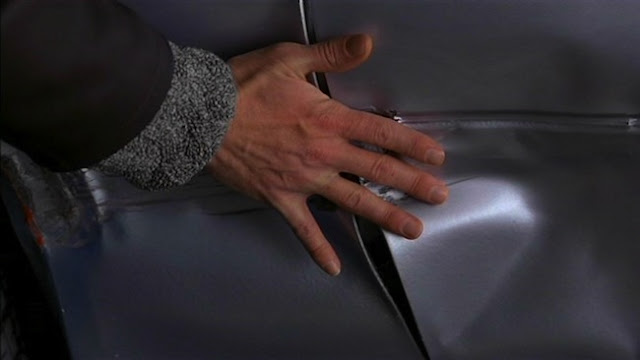Whit Stillman at the disco ball

No one captures the comic contradictions of a certain kind of urban relationship quite like Whit Stillman.
Droll and playful, "Last Days of Disco" is deceptively structured, as nuanced and layered as a novel in behavioral filigree. As in "Metropolitan" and "Barcelona," Stillman makes his characters smart enough to dig themselves a hole but not always dig themselves out. Set, as an early title says, in "The Very Early 1980s," "Disco" follows the romantic roundelays of several friends just out of college and the people they meet in their publishing jobs and in their favorite club, an unnamed disco they treat as some kind of salon. They're kids, new to the city; they don't know their beloved disco music and hangout they've only just discovered are near their end. Stillman's familiar portraits of the group dynamics of the young and overly privileged are richer than ever, and their social cruelty ripples with bursts of extravagant verbal wit.
Stillman regular Chris Eigeman plays Des, one of the club's managers, and as always, manages to make abrasive verbosity almost seem cuddly. ("I'm not an addict," he says with total conviction, "I'm a habitual user.") He meets his match in Kate Beckinsale, as the mercurial, compulsive Charlotte, a ferocious, unrelenting manipulator who always speaks what's on her mindlessness. (Through Charlotte's outrageous self-justifications, Stillman shows himself a master of capturing exquisite bullshit as well.) As Alice, Charlotte's reluctant roommate and co-worker on the lower rungs of a prestigious publishing house, Chloe Sevigny is luminous. To call her a "natural," as some critics have, does a disservice to her fresh talent. She's been appealing in films such as "Kids" and "Palmetto," but the poignant gravity she brings to Alice, and her acute delivery of Stillman's dialogue mark her as someone to watch. The 46-year-old Stillman worked with what he calls "prosaic license" in writing his script. "There's a kind of reinvention of the wild, wild times in these clubs. We're really telling one civilian story. People who do go a lot and become part of the group, they know a guy who runs the back door, but they're not the wild downstairs VIP crowd."
During the editing of "Barcelona," Stillman became infatuated with his scenes of Tuschka Bergen and Mira Sorvino dancing in discotheques. "It reminded me of my period as a failed short-story writer, something I wanted to write about was that moment when people have their first jobs and they settle into a place. It took me about a year-and-a-half to earn enough money to find the worst apartment in New York and move out of home. I remember those first weeks of having your own apartment, a beautiful day like today in the spring, walking uptown and running into people all over. I thought that kind of new-kids-in-the-big-city daytime story could mix well with the disco story." He doesn't see his characters as being particular emblems of a certain class. "In this country, there's a broad class of people who've gone to universities. Wherever they started, they go through the mill and they come to the city and they get professional jobs, publishing jobs. There is a similarity as the people sort themselves out, but it's not necessarily about where they came from."
Stillman's self-aware characters could talk rings around Tarantino's; there is an instant classic of a scene where the characters take sides in bashing "Lady and the Tramp," unwittingly reflecting their own traits. A mention of Tarantino brings a smile. "I think 'Metropolitan' came out before 'Pulp Fiction.'" He laughs. "Instead of [making references to Jane Austin's] 'Mansfield Park,' the idea is now to get into territory that many people can relate to and support our larger budgets. It can't just be Lionel Trilling any more!" After seeing "Barcelona" go over the heads of a Brazilian audience, he decided to change tack just a little. "It's the kind of reference that works not only here, but everywhere. Even if it's a film in which there is some important talk, the talk should be about things people all over the world know about."
Unlike some contemporaries, Stillman takes his time writing a script. "The process is really bad in the sense that I don't feel suited to it. I feel much more comfortable editing. It's a tough process to get enough material so I can get into editing it. Woody Allen says that he gets these ideas going down the stairs from where he lives or walking and my wife has a picture of me sort of half-shaven, typing on my word processor. I started shaving, I got an idea...." He shrugs. "That's kind of how it works. Generally, it takes me so long to write a script that by the time that's done, there's financing. I've always had the financing way before the script. I've lost producers because they get tired of waiting!
"For me it's also really important to write with a fifteen year time lag," he adds. "That's another reason for the disco period. In 1994, fifteen years put me plonk in the middle of that period. I find I can't write about the present. Only through the past do you get through the mist of stuff you want to remember. And also I don't like all popular culture. When something happens in popular culture that I respond to, I want to hold onto that. It was one period that I thought was fun and interesting."
[Published in slightly different form in New City, June 1, 1998.]
